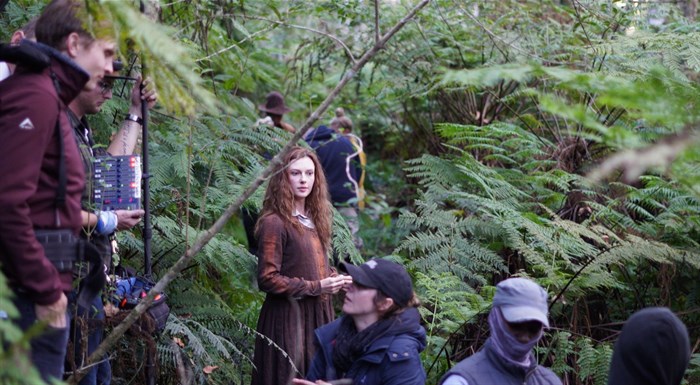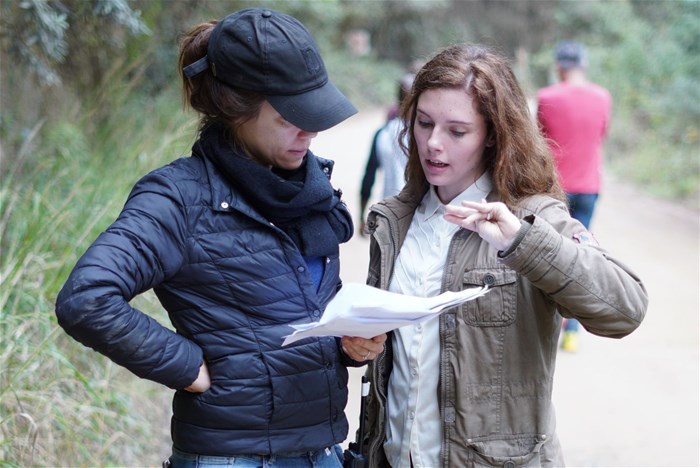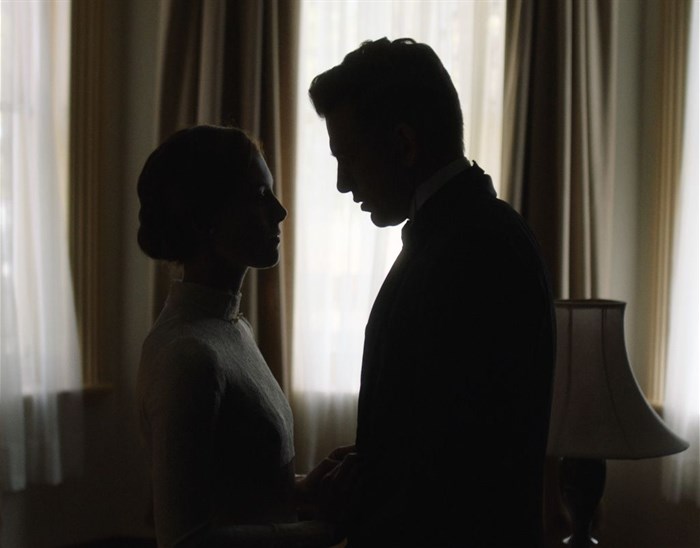
Top stories






More news





ESG & Sustainability
#Sona2026: President announces crisis committee to tackle SA's water challenges










Writer-director Rooyen shares a few thoughts with Daniel Dercksen about her magical South African film Toorbos.

It could be because I’ve lived with the story for almost a decade that I would love that to be true. The themes of the book, which I have explored in different ways in several other stories. Majority of my writing looks at the psychological headspace of a female character who is caught between reality and a ‘dream space’. I love filming in beautiful settings and exploring my characters through the impact that a certain landscape has on them.
This comment warms my heart. When undertaking a feature film, personal pressure is immense in ensuring that the project is meaningful and truthful. From the outset, it was to approach it with complete honesty. I didn’t want it to be referenced or feel like another film but form part of my quest in also giving South African cinema a unique and authentic voice.
That’s the beauty when working on adaptations, you have a solid base from which to build, with deeply researched characters and stories that explore unique undiscovered settings. More so, the themes are complex – ours was built around the rootedness of the forest people as they struggle between the developing world and their connection to nature.

Exactly, and yet, even though this argument is so current, we – like the protagonist – struggle to truly see the importance and prioritise our connection to nature. Karoliena is pushed and pulled in between two worlds. An enigma walking along with two dualities – the one that offers her financial prosperity and comfort, the other, which is deeply rooted in her psyche – a yearning that she struggles to define – and that’s her deep connection to nature. Throughout the story, she questions which of these two opposites will truly give her personal freedom. She struggles in not only prioritising her own connection to nature but also in convincing those around her why it’s important.
Yes, it’s been a keen interest of mine for many years. To describe it in its simplest form is looking at how the more gentle indigenous communities with their deep spiritual connection to nature have been marginalised and uprooted by the more ‘progressive’ societies. It happens time and again and the outcome mostly favours those who prioritise economic progress.
This is most likely why I fell in love with the story at the start. I read it in the year I was married, 2012. What Dalene captured in her writing was the essence of this. Both characters needed to become their ‘full self’ in order to love each other truly. In both cases, they couldn’t achieve this, without reconnecting with the forest. Both Karoliena and Johannes, upon witnessing the forest’s magic, could transcend beyond their false realities, to become their authentic self and, therefore, finally connect and love one another.
Yes. Karoliena’s search for personal freedom and being true to herself is what makes her so admirable. She’s on a quest to define her authentic self, even though she cannot find a map on how to achieve it, other than better learning to trust her gut and following that with determination and fortitude. Today, we have mindfulness podcasts, breathing, meditation, self-reflection, yoga retreats, nature breaks anything that can help us ‘be ourselves’. We, like Karoliena, move further away from being able to trust our gut and act truthfully or create with authenticity. Isn’t it worrying how easily we as groups can become manipulated and almost ‘infect’ one another. This metaphor in Toorbos is told through the difference between the new plantation trees and the old indigenous forest. The plantations are exact replicas, with the hard needle-like leaves, they poison the forest floor and are easily susceptible to fire outbreaks and sickness (think about the recent Knysna fires and the destruction of the pine forests), whilst the indigenous forest is wild, every tree different and in their ‘authenticity’ each plays an important role in giving life to one another and allowing the forest to prosper.
Having been raised on a farm, I find the times where I’m most truthful and connected to myself, is when I’m visiting my home with the stillness of that space. Where I’m disconnected from the rush of life and my career. I recently travelled to Peru and hiked the Inca trails and camped deep in the Amazon forest. One of my most vivid memories was sitting at the front deck of our four-man boat, as we travelled up-river. Those experiences, even though it’s only for a few weeks, have an immense impact on my own self-awareness and re-evaluation of my goals and what’s important. In the rush and mayhem of life, if we don’t take a step back, cut ourselves off and connect to nature, it’s very difficult to remain truthful and authentic – especially as creatives. I find that when I don’t do that, I’m more easily manipulated in the way I create – to follow group thinking or trends and ultimately I get stuck at writing.
We had a very strong pre-production phase. I felt safe in that I was working with an excellent team. We clearly defined the vision almost two months in advance and from there every department started to design within it. Having worked on the screenplay for so many years and especially with how complex Karoliena was, I needed to let her go and hand her over to an actress I could trust. Elani started breaking down her character three months prior to filming. She did extensive research on the era. She did voice training for weeks. Classes that shifted her body language. She and Stiaan started dissecting the screenplay. It was important for the story that they felt completely empowered. In rehearsals, we spent quite a bit of time, incorporating their notes and ideas into the screenplay. We had solid boundaries in which to create, but the story does ask for every member to be empowered.

We all felt a great sense of responsibility in doing a Dalene Matthee adaptation. Even more so did Elani and Stiaan. They spent hours together in not only understanding their characters on-screen but also getting to know each other off-screen. The connection on screen is real and truthful because that was what was taking place behind the cameras. They were incredibly disciplined in guiding one another and spent hours discussing character, the screenplay and understanding their arcs to ultimately create a sense – that even though they’re apart and in conflict for such a large part of the story – they are ‘meant to be’. I’m glad that this is the experience, because it reflects on the actors’ hard work, and since they’ve made it public, it’s also interesting to note that this connection had started on set, three years down the line, they are still together.
When approaching the magical elements, it was of utmost importance to keep it organic, gritty and real. We wanted to create as much as we could in-camera with on-set SFX and leave as little possible to VFX. We referenced Andrei Tarkovski a great deal in designing the mythical ‘magical’ scenes. Wind, for example, plays an important role in bringing the forest to life. We needed to make it a living breathing entity that could compete with Johannes. Yet, there was not a breeze in the forest. For this, wind machines and wind blowers are in every scene where there is even the slightest movement. There are other elements; like dust, rain and mud that we created on set. The tree spirit was VFX, but the same principles applied – we never wanted the audience to see that it’s VFX. We shot images with the different indigenous trees’ dried out leaves and the wonderful team from Two Tales Animation put it together. Ultimately, when looking at the ‘magical’ moments, the audience has to question whether it’s real or not. They need to be struggling through the same dualities as the protagonist.
Yes, it shows the tug-of-war between the masculine and the feminine. Not only in Karoliena and Johannes but also in the themes that it explores. Whether we are male or female, we possess both, but society has boxed us in or placed more importance on certain qualities. It’s when Karoliena and Johannes start challenging one another, that they start reflecting on their own masculine and feminine identities. He has as much an impact on her thinking and understanding, as she has on his. That is why it’s incredibly important that we fight for our own authentic self, not only to challenge one another in society but also to find a better balance in the world between the masculine and feminine. I believe a lot of healing can take place when this would happen.

It’s frightening. We’re hearing that the bigger budget local features might suffer, whilst we will be witnessing more low-budget straight to VOD/TV offerings in the years to come. The filmmaking approach between the two is vastly different. For cinema films, it’s a longer process, you’re taking more risks, thinking differently, being more creative and challenging filmmaking to create an immersive cinema experience. In TV, because of the incredibly short turnarounds, there isn’t much time and you easily fall into formulaic filmmaking. We’re going to have to work especially hard to convince financiers and audiences why they need to go to the cinema.
I hope to transport them into a place they haven’t yet discovered, fall in love and when they leave, having, hopefully, challenged their own world views. Most of all, I wish for them – especially after this time locked in with Covid – to enjoy the setting and experience escapism for the two hours travelling through the 1930s Knysna forests.
Toorbos opens in SA cinemas Friday 13 November 2020.
Read more about the latest and upcoming South African films.
